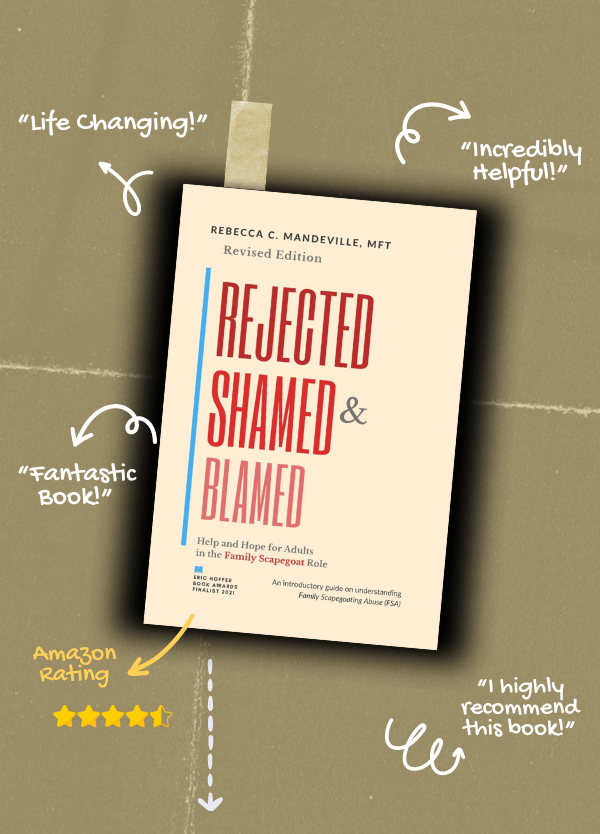
Rejected, Shamed, and Blamed by Family?
Family Scapegoating Abuse (FSA) can be insidious and subtle. Are you suffering from FSA and its effects?
Defining Family Scapegoating Abuse (FSA) for Adult Survivors
Rejected, Shamed, and Blamed: The Book
My introductory book on what I named Family Scapegoating Abuse (FSA) has helped adult survivors all over the world understand what happened to them in their families. Learn what type of abuse you might be suffering from by reading the first book written on FSA.
– Rebecca C. Mandeville, MACP, LMFT, CCTP

Rejected, Shamed, and Blamed
To heal from abuse, we must first understand what type of abuse we are trying to recover from. My introductory book on FSA provides adult survivors with a language to describe their painful and confusing family dynamics while also legitimatizing their experiences.
View →

Rebecca C. Mandeville, MACP
Rebecca is a licensed Clinician, Complex Trauma Treatment Professional, and Researcher. She coined the term ‘Family Scapegoating Abuse’ and wrote the first book ever written on FSA, ‘Rejected, Shamed, and Blamed’.
View →

Private Membership Community
Coming June 2024: Connect with other FSA adult survivors in a private online community setting. Engage in individual and group chats, access FSA resources, or upgrade to participate in a ‘deep dive’ study of ‘Rejected, Shamed, and Blamed’.
View →
Why Learn About FSA?
Family Scapegoating Abuse (FSA) and its traumatizing effects are not always obvious, even to Mental Health professionals.
Many FSA adult survivors have no idea that they are suffering from FSA and its effects because they assume (or have been told) that this form of abuse always includes overtly aggressive or abusive behaviors such as bullying, being ganged up on, and family ‘mobbing’ behaviors.
As confirmed by my qualitative research results over the past 15 years on what I eventually named ‘Family Scapegoating Abuse’ (FSA) – as well as my clinical experience working with scapegoated adult survivors and my own experience of being in the ‘family scapegoat’ role – FSA can be silent, insidious, and subtle.
This is why I consider FSA to be a devastating form of systemic ‘invisible’ (psycho-emotional) abuse that can be soul-crushing.
It is also critical that adult survivors and Mental Health professionals know that FSA can happen in any type of dysfunctional family system – not just a narcissistic one. (And yes, there is a difference. And yes, some family systems are both both dysfunctional and narcissistic – and more).
My Family Systems and Trauma-informed, research-based, clinically sound FSA offerings will help you understand what happened to you in your family and what you need to do to heal from being ‘rejected, shamed, and blamed’ by the people who were supposed to love and care for you the most.
I encourage you to take a moment to further explore my offerings here on the home page of my website, which have been thoughtfully designed to assist adult survivors of FSA in their recovery.
What Is FSA?
I’ve spent over 15 years researching on what I eventually named ‘Family Scapegoating Abuse’ (FSA). Read a summary of my findings here.


Healing From Abuse Is a Process – Take the First Step in Your FSA Recovery Journey
Over the past 20 years I’ve helped hundreds of adult survivors of FSA release the many distorted narratives imposed upon them by their family-of-origins that damaged their sense of identity and self-esteem.
As an adult survivor of FSA myself, I understand the challenges of recovering from ‘invisible’ family abuse, which is why I have dedicated my career as clinician, educator, researcher, and author to raising awareness regarding the profoundly damaging effects of FSA. My 90-minute Single-Session Consultations are a means of ‘jump-starting’ your FSA recovery if you are feeling stuck and unsure of how to progress in your healing. Learn more about my international Single-Session Video Coaching Consultations by clicking on the button below. NOTE: The SSC Waiting List reopens in July 2024. Feel free to check back then.
Join the Beta Test Version of Our New Private Community for Free!
We are launching a private (paid) community in June 2024 on Circles.so. This is a place for FSA adult survivors to connect with each other in dedicated topic spaces using live chat and direct messaging features. I’ll also be hosting a ‘Rejected, Shamed and Blamed’ Book Discussion group, along with educational courses and special events designed to support members in their FSA Recovery.


Subscribe to the FSA Education Newsletter
I send a new article out about FSA-related topics a few times a month. I won’t ever share or sell your information.
Sign Up To My FSA Education Newsletter Here
Visit My Blog
Stay informed and inspired with my FSA-focused posts; published articles; and latest surveys and research findings.
Read blog →
Media Inquiries
Let’s connect! Reach out to me if you’d like me to speak at your online summit or event.
Email Me Here
Subscribe to My YouTube Channel
Suitable for both FSA Adult Survivors and Clinicians
Scapegoat Signs: What Adult Survivors and Clinicians Need to Know

Thank you for your work and research on FSA. As a therapist I could rave about your book for ages and have recommended it to all my clients. Having also gone through these experiences personally, I can also attest to the amount of validation this book offered that has helped me heal more so than many many therapy sessions. It was clinically sound, well researched and trustworthy in its empirical sources and framework. I just wish I could get my family to read it so they could see the damage that they’ve done! Though the book explains why that won’t ever be possible. An absolute must read!!
Amazon Reviewer
